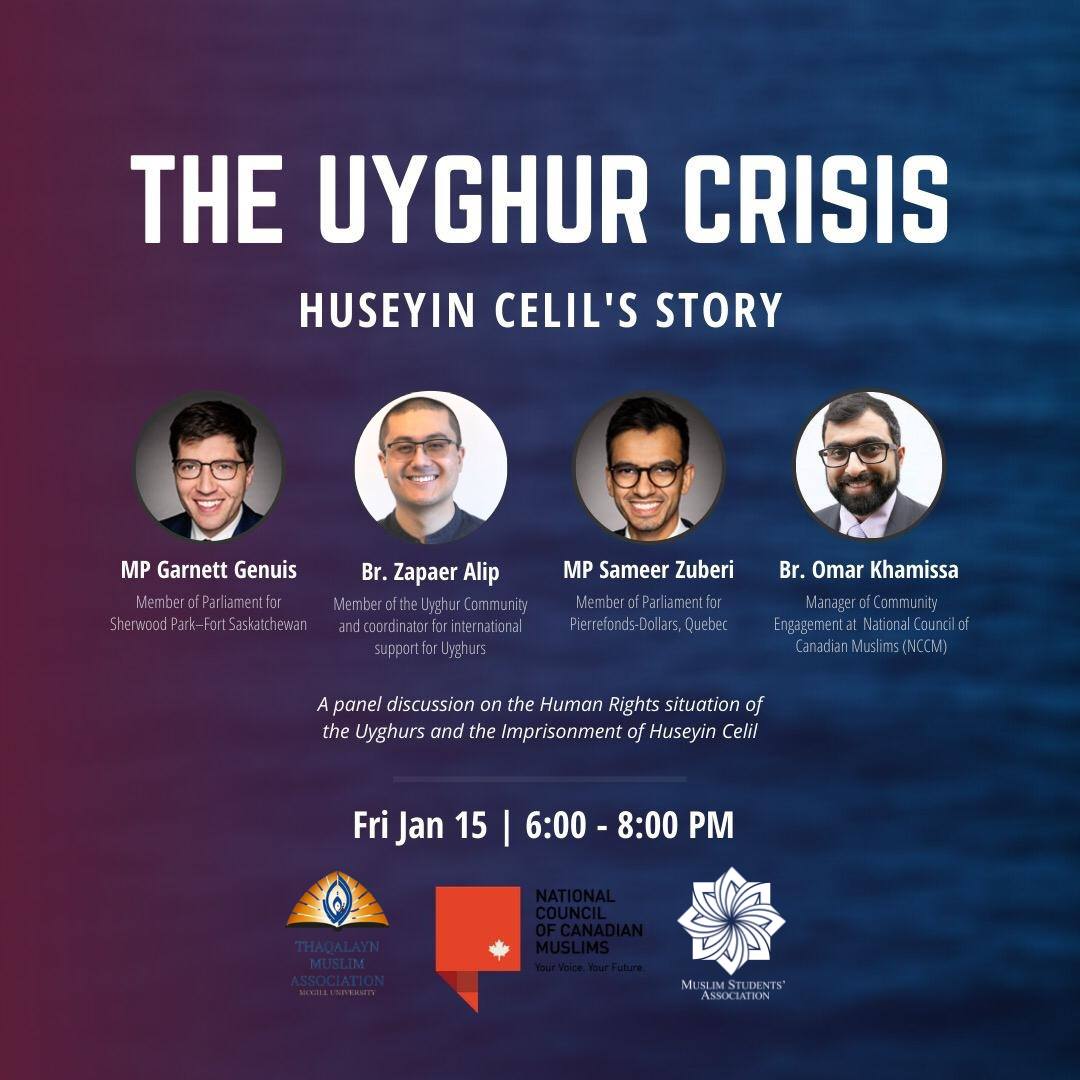The McGill Muslim Students Association (MSA), McGill Thaqalayn Muslim Association (TMA), and the National Council of Canadian Muslims (NCCM) held a virtual panel on Jan. 15 to discuss the Uyghur genocide. Omar Khamissa, NCCM community engagement manager, moderated the panel, which was composed of Member of Parliament (MP) Garnett Genuis, MP Sameer Zuberi, and former McGill student Zapaer Alip, B.Eng ‘13. The three panelists discussed the ongoing persecution of Uyghur Muslims in the Xinjiang autonomous region in northwest China, and described potential actions that Canadians can take to mitigate the crisis.
Zapaer Alip, who is a Uyghur-Canadian coordinator at the advocacy group International Support for Uyghurs, detailed the lives of Uyghurs living both in and outside of modern concentration camps, noting the Chinese government’s effort to erase the customs, language, and livelihoods of their people.
“It wasn’t easy being a Uyghur in East Turkestan,” Alip said. “The oppression started to amplify gradually [….] First, you had to learn Mandarin. You couldn’t speak Uyghur, you couldn’t attend a Uyghur school, you couldn’t get ahead in life, if you didn’t speak Mandarin [….] It was impossible to teach or practice religion. People could report you for practicing religion [….] You were encouraged to become a member of the Communist Party.”
After moving to Germany to escape the conditions back home, Alip’s family eventually moved to Canada for fear of being deported to China as he did not have German citizenship. But even after becoming permanent residents of Canada, Alip’s family faced issues contacting their family in Xinjiang.
“People might ask, ‘why aren’t you reaching out to [your family]’?” Alip said. “Why wouldn’t you call them everyday? Why wouldn’t [you] do whatever it takes to get a hold of them? Well, the issue is, as we later found out, that one of the reasons why you could end up in a concentration camp is actually having somebody live abroad.”
Genuis, the MP for Sherwood Park–Fort Saskatchewan in Alberta, said that ever since his election in 2015, he has been an outspoken advocate for human rights and religious freedom. Genuis is pushing for accountability mechanisms that will pressure the Canadian federal government to designate the persecution as a genocide and impose sanctions on China. He encouraged Canadians to voice their concerns and contact their elected officials.
“[Elected representatives] need to champion these issues and speak out clearly on them and seek policy changes,” Genuis said. “There needs to be real sanctions targeting individuals responsible, recognition of the crimes that are taking place, and meaningful trade measures.”
The panel then described what students could do on campus and within their communities to raise awareness about the Uyghur genocide. All three speakers encouraged students to educate themselves and others about the crisis, challenge professors to use their platforms to educate students and peers, get involved in student government, and host events on campus to bring attention to the crisis.
As a member of the parliamentary committee on the Uyghur genocide, Zuberi gave insight into China’s misuse of Canadian research and surveillance technologies. Several Canadian universities, including McGill University, University of Toronto, and University of Waterloo, collaborated with Chinese researchers, who later developed technologies that have been used to surveil Uyghur people. Academic exchange between scholars occurred largely in the fields of artificial intelligence (AI), robotics, and engineering. Zuberi encouraged students to think more critically about research practices on their respective campuses.
“Create spaces on campus where you can speak about these issues,” Zuberi said. “There is a real concern here. We know that Canadian technology is being used to surveil Uyghur people in the region. There are cameras on every corner and monitoring is happening constantly. Canadian technology in part is furthering that, alongside technologies from many other countries. There needs to be [more] awareness around that.”









